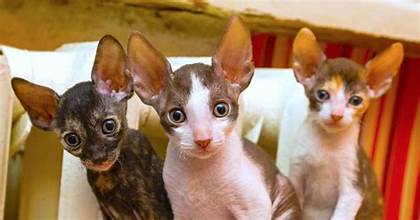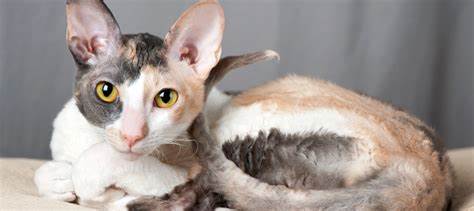The Cornish Rex is a fascinating and rare breed known for its playful personality, distinct appearance, and affectionate nature. Whether you’re considering adopting one or want to learn more about these elegant cats, this guide will cover everything you need to know, from their origin and personality to their unique features and care needs.
Origin of the Cornish Rex
The Cornish Rex breed originated in Cornwall, England, in 1950. Due to a natural genetic mutation, a kitten named Kallibunker was born with an unusual curly coat. This kitten became the breed’s foundation, and through selective breeding, the Cornish Rex developed into the sleek, curly-coated cat we know today. Unlike most cats, the Cornish Rex lacks a thick outer coat and has a soft, wavy undercoat that gives it a distinctive appearance.
Personality and Temperament
These cats are known for their lively and playful nature. They are brilliant, social, and often compared to dogs in their affectionate behavior. They thrive on human interaction and love being involved in daily activities. Their energetic nature means they can adapt well to both small apartments and larger homes. They are also lively, enjoying games like fetch and climbing high perches. Due to their outgoing nature, they make excellent companions for families, singles, and even other pets.
Discover the Intriguing Features of the Cornish Rex
One of the most striking features of the Cornish Rex is its short, wavy coat, which is incredibly soft to the touch. Other unique characteristics include:

- Large, bat-like ears that give them an alert and inquisitive look.
- A slender and muscular body, which makes them agile jumpers.
- A long, whippy tail that adds to their elegant appearance.
- A distinctively high metabolism leads them to have a hearty appetite.
Understanding the Care Needs of the Cornish Rex: Essential Information for Potential Owners
Despite their short coats, Cornish Rex cats require specific care to keep them happy and healthy. Here are the key aspects of their care:
Grooming
Unlike other cats, the Cornish Rex does not shed much due to the lack of a thick outer coat. However, their fine fur means they can get oily skin, so occasional bathing is necessary to keep their coat clean and buildup-free. Regular brushing can also help distribute natural oils and keep their coat in good condition.
Temperature Sensitivity
Since they lack a protective outer coat, Cornish Rex cats are more sensitive to temperature changes. They love warmth and may seek cozy blankets or sunny spots to stay comfortable. In colder months, a cat sweater can help keep them warm.
Diet and Nutrition
Due to their high metabolism, Cornish Rex cats require a well-balanced, high-protein diet to maintain their energy levels. Providing quality cat food with essential nutrients will keep them in peak condition.
Exercise and Mental Stimulation
These cats are highly active and intelligent, so they need plenty of interactive playtime. Puzzle toys, climbing structures, and engaging games will help keep them entertained and prevent boredom.

Health Considerations
While generally healthy, Cornish Rex cats can be prone to certain genetic conditions, including:
- Hypertrophic Cardiomyopathy (HCM) – a common heart condition in cats.
- Patellar Luxation – a condition affecting the kneecap.
- Skin issues due to their lack of a protective outer coat.
Regular veterinary check-ups will help catch potential health issues early and ensure your Cornish Rex stays healthy.
Final Thoughts
The Cornish Rex is a unique, loving, and energetic breed that thrives in an interactive and engaging environment. Its affectionate and social nature makes it an excellent companion for those who can provide it with the attention and care it needs. If you’re looking for a playful, intelligent, and full-of-personality cat, the Cornish Rex might be the perfect pet for you!




